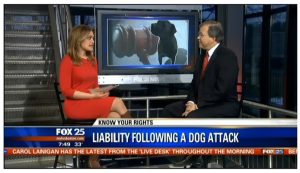Personal Injury
Massachusetts Law on Waivers and Releases
 The proposition is all too familiar: You or your children want to participate in an activity. It could be at school, for a sporting event, in connection with a walk-a-thon or bike-a-thon, or in some other activity where there is a risk involved. Maybe the event is really risky, such as learning to drive a race car, or learning how to rock climb. Part of the price of admission to all of these activities is your signature at the bottom of a release or waiver of liability.
The proposition is all too familiar: You or your children want to participate in an activity. It could be at school, for a sporting event, in connection with a walk-a-thon or bike-a-thon, or in some other activity where there is a risk involved. Maybe the event is really risky, such as learning to drive a race car, or learning how to rock climb. Part of the price of admission to all of these activities is your signature at the bottom of a release or waiver of liability.
The language of the typical release is usually very broad and even includes the requirement that you indemnify the organization against related claims. You will be binding not only yourself, but your family, and in the case of a wrongful death, your heirs.
Are they legal? Most of the time yes, though there are some important exceptions which will be discussed below.
The Massachusetts courts generally uphold the validity of releases and waivers that are entered into knowingly. This includes pre-accident releases as well as releases in connection with settlements. Our courts have repeatedly affirmed just how broadly Massachusetts law favors the enforcement of releases.
Simply put, a defendant ordinarily may “validly exempt itself from liability which it might subsequently incur as a result of its own negligence.” Lee v. Allied Sports Assocs., 349 Mass. 544 , 550 (1965) (car racetrack accident).
In the more recent case of Sharon v. City of Newton, 437 Mass. 99 (2002), the court enforced a release signed by a father on behalf of his daughter as a condition of her participation in cheerleading in her high school. After she was injured, the family brought suit for the school’s negligence. The release was raised as a defense, and the court strongly affirmed the enforceability of the release, citing a host of public policy arguments.
The requirements for a binding release include clear and conspicuous language, proper naming of the party, the signature of the party, and valid contractual “consideration.” Consideration, meaning something of value that is exchanged, is satisfied by the participation in the activity.
Some particularly disturbing releases seek to include third parties who may be related to the activity named in the release. For example, your school child may wish to participate in after-school volunteer activities, and the release required to participate may include all the companies participating in the program. Now assume something horrible–the contracting company had failed to screen its employees, and a dangerous criminal was employed and caused your child harm. The negligent hiring would likely be within the scope of the release.
There are some exceptions to enforceability of releases. There are certain statutory exceptions that apply. One exception (and it is one that is frequently violated) is a release of liability to join a gym or health club. G.L. c. 93, Section 80 makes such language unenforceable and, in fact, a violation of G.L. c. 93A, the Consumer Protection Act. If you are injured in a health club due to equipment failure, a defect on the premises, or the negligence of a staff person, you will be able to bring your claim. Here is a related blog on health club waivers and releases.
Although a party may contract against liability for harm caused by its own negligence, it may not do so with respect to harm caused by its gross negligence. Zavras v. Capeway Rovers Motorcycle Club, Inc., 44 Mass. App. Ct. 17 (1997). See also Gillespie v. Papale, 541 F. Supp. 1042, 1046 (D. Mass. 1982).
A party may not contract against liability for harm caused by violation of a statutory duty. Zavras v. Capeway Rovers Motorcycle Club, Inc., 44 Mass. App. Ct. 17, 19 (1997), citing Gillespie v. Papale, 541 F. Supp. 1042, 1046 (D. Mass. 1982).
A release may be avoided, in part, if it is the result of a “mutual mistake.” In the exceptionally rare case of Leblanc v. Friedman, 53 Mass. App. Ct. 697 (2002), a settlement release was not a complete bar to a subsequent claim by the plaintiff. The plaintiff settled a medical malpractice case arising from an instrument left in her body, and although the release was worded broadly, the court found there was a question of fact whether it was meant to include another injury not described in the release itself.
What Should You Do?
Entering into a release is an important contractual event. You should consider whether the reward overrides the risk. Some pre-enrollment due diligence is a good idea–ask about the staff involved, inspect the premises, get some references. If you are not willing to release all of your claims, try crossing out the offending language or simply not signing the release. However, most organizations are wise enough to recognize and disallow both of those techniques.
It would be appropriate for the Massachusetts legislature to consider revising the law of pre-accident releases. Sadly, that day does not look likely to come any time soon.
Contact our Boston attorneys today
The lawyers at the Boston firm of Breakstone, White & Gluck represent clients who have suffered personal injury as a result of the negligence of others. We have had experience identifying unenforceable releases which has allowed our clients to proceed with their claims for compensation. For more information and a free consultation, contact us today at 800-379-1244 or 617-723-7676 or use our contact form.
What Massachusetts Consumers Need to Know about Health Club Contracts

If you exercise at a health club, you may not be aware that Massachusetts law protects you in many ways from unlawful club contracts. But many local health clubs – yours may be included – are regularly violating the law.
Health clubs are serving larger numbers than in the past. Over 50.2 million Americans now hold gym memberships, a 10 percent increase over the past three years, according to the International Health, Racquet & Sportsclub Association.
The industry has been known to make it challenging for members to cancel or put their memberships on hold. Sometimes, after you sign the cancellation agreement, they require you to pay until month’s end, then another full “last month.” In addition to monthly membership fees, many are also now adding new fees for “annual” memberships and equipment maintenance. Some are even charging cancellation fees up to $200. This is still legal in Massachusetts, though not at all consumer friendly.
But did you notice the fees clearly posted the last time you visited your gym? If not, your gym is violating the law. The Massachusetts Office of Consumer Affairs and Business Regulation recently inspected 15 local health clubs and found none were displaying fees or informing consumers of their right to cancel within three days, according to WBZ-TV. The office is referring the results to the state Attorney General’s office.
Health clubs cannot ask a member to sign a waiver of liability but, surprisingly, many still do. While waivers of liability, also known as releases, are generally enforceable in Massachusetts, G.L. c. 93, Sec. 80 specifically states, “No contract for health club services may contain any provisions whereby the buyer agrees not to assert against the seller or any assignee or transferee of the health club services contract any claim or defense arising out of the health club services contract or the buyer’s activities at the health club.”
This means gyms have a duty to properly maintain their premises and equipment and make sure they are being used in a safe manner, according to the manufacturer’s guidelines. If they do not, and they were negligent, they may be responsible for your damages. If you have been injured in a Massachusetts gym, the court should find the liability waiver void. Over the years, our injury lawyers have successfully challenged these agreements.
Gyms also cannot ask members to sign up for terms longer than 36 months or require that members agree to financing that lasts longer than one month beyond the membership period. Members cannot be required to agree to monthly automatic withdrawals from a bank account.
If you are joining a gym, the best thing you can do is read the fine print on your member agreement before signing. Research the organization online through your local Better Business Bureau website.
Consumer remedies for health club violations are limited. No health club will be permitted by the courts to enforce an illegal contract. A consumer may bring claims under the Massachusetts Consumer Protection Act, G.L. c. 93A, but damages will usually be nominal, although attorneys’ fees would be available.
Recent Court Ruling
The possibility of class actions was virtually eliminated by the recent ruling by the Supreme Judicial Court in Tyler v. Michaels Stores, Inc., 464 Mass. 492 (2013). An invasion of a consumer’s rights may be a violation of G.L. c. 93A, but unless the consumer has suffered a separate, identifiable harm arising from the violation, there will be no remedy. This case put a disappointing crimp into collective consumer action to prevent violations of the Consumer Protection Act, leaving overworked state officials to take up the slack.
Attorney David White Discusses Massachusetts Dog Bite Law Following Mansfield Dog Attack

The law is “very cut and dry,” when it comes to liability for Massachusetts dog bite cases, attorney David White told Fox-TV Boston recently.
White, a partner at Breakstone, White & Gluck of Boston, spoke on the network’s morning program about Milo, the Mansfield dog which attacked and seriously injured a 6-year-old boy on Jan. 3. The boy suffered severe facial lacerations and required more than 400 stitches. Last week, the Mansfield Board of Selectmen held a hearing and voted 3-2 to euthanize the dog. The dog’s owners said they planned to appeal the vote in District Court and were allowed to take Milo home after the hearing. Then, the dog attacked again, this time over the weekend on West Street in Mansfield, and ended up being euthanized before any appeal. In the second attack, the dog bit a 16-year-old teenager, who was sent to Hasbro Children’s Hospital to be treated for injuries. See news coverage.
In the TV interview, White explained the process in Massachusetts for protecting communities from dangerous dogs. When someone is injured after a dog bite, the incident is reported to a local animal control officer, police or the Board of Selectmen. The board holds a hearing to determine if the dog is dangerous. It then votes on appropriate action, which may include muzzling the dog, restraining it, ordering it to leave town or other steps.The dog owner is allowed to appeal in the District Court.
When someone is injured by a dog in Massachusetts, they can also file a lawsuit in civil court to recover damages under M.G.L. c. 140, Sec. 155.
White said the law holds dog owners strictly liable for dog attacks, only providing a few exceptions. They include if an injured person is tormenting a dog or trespassing on another person’s property. Some states have a “one bite” or “first bite” rule, but not Massachusetts.
“The law is very cut and dry,” White told Fox. “And furthermore if there is an injury to a child under the age of 7, there is a presumption the child was not teasing or tormenting the dog.”
When someone is injured, they are not required to prove the dog has injured before or that the dog is vicious.
White advised dog owners to make sure they have coverage for dog bites and attacks on their homeowner’s insurance policies. If your insurer does not provide coverage, he says find another provider who does.
Approximately 4.5 million people are bitten by dogs each year in the United States, according to the U.S. Centers for Disease Control and Prevention.
Children are the most frequent victims, with those ages five to nine accounting for the largest numbers of injuries.
Bus Accident Injures More Than 30 Students on Boston Overpass
State Police continue their investigation into last weekend’s bus accident on Soldiers Field Road in Allston, which injured more than 30 passengers.
The Calvary Coach bus, which was carrying approximately 40 students and chaperones from the Philadelphia area, was returning to Pennsylvania Saturday night when the crash occurred. The vehicle reportedly struck the Western Avenue bridge on the road which leads to the Mass Turnpike.
The Boston Fire Department released photos on Twitter showing firefighters standing on the bus and ladders, extricating passengers, some trapped in the vehicle for more than an hour. Several passengers were transported to local hospitals with injuries. At least one 17-year-old remained in critical condition in a Boston hospital on Monday, The Boston Globe reported.
The students were with the Philadelphia area non-profit, Destined for a Dream Foundation, which spent the day visiting Harvard University and Cambridge.
Massachusetts State Police said the bus accident occurred after the driver passed signs posted prohibiting the bus from traveling on that road, which has a 10-foot height limit, according to the Associated Press. State Police are investigating and have not determined whether to file charges or issue a citation against the 66-year-old driver, Samuel J. Jackson. CBS Philadelphia reported that the owner of the company, Ray Talmedge, said Jackson had looked down at his GPS and saw the bridge too late.
Calvary Coach apologized after the bus crash but defended the driver, reported the Boston Herald. The company’s buses have not been involved in a crash in the two years prior to the Boston accident, according to the Federal Motor Carrier Safety Administration. An unidentified driver was written up for unsafe driving.
The state Department of Conservation and Recreation, which maintains Soldiers Field Road, told the Boston Globe it installed rubber signs as a warning for truck drivers. For a period, they also used cowbells to sound an alert, but these were discontinued.
But the Western Avenue bridge never received rubber warning signs, an official with the state agency said. Agency officials told the Boston Herald they would contact GPS navigation companies to ensure the bridge’s height restrictions are recorded.
Related:
Bridge at site of crash lacked height warning, The Boston Globe.
Bus driver may have been distracted by GPS before Soldiers Field Road crash, CBS Boston.
Parents of bus crash victim pray for recovery, Boston Herald.
MassDOT: No plans to raise height of overpass after bus crash, CBS Boston.
Read More
Toyota Settles One of First Wrongful Death Cases
 A month after being assessed a record $17.4 million fine, Toyota Motor Corp. has settled one of the first wrongful death lawsuits involving sudden and unintended acceleration by its vehicles.
A month after being assessed a record $17.4 million fine, Toyota Motor Corp. has settled one of the first wrongful death lawsuits involving sudden and unintended acceleration by its vehicles.
The Japanese automaker confirmed last week it had reached an agreement with the family of Paul Van Alfen and his son’s fiancee, Charlene Jones Lloyd, for an undisclosed amount in the November 2010 accident in which they died, USA Today reported. The automaker said it has also settled another case filed under California’s lemon law by a retired Los Angeles police officer.
Van Alfen and Lloyd were killed in 2010 when the Toyota Camry they were traveling in on Interstate 80 in Utah suddenly accelerated. Van Alfen, the driver, attempted to stop the vehicle, but ran through a stop sign and into a wall. His other passengers, his wife and his son, were injured. The Utah Highway Patrol investigated and determined the car accident was the result of a sticking gas pedal.
Other Injury Lawsuits. The settlement comes as a group of lawsuits consolidated in U.S. District Court in Santa Ana, California moves forward. Prior to the consolidation, Toyota had also reached a $10 million settlement in a case involving an auto accident which killed a California police officer and his family.
The officer and his family were killed near San Diego in 2009 when their Lexus accelerated above 120 mph, struck an SUV, rolled off an embankment and burst into flames. The car accident was blamed on a improperly sized floor mat which was trapped in the accelerator.
More Than $1 Billion Settlement. In December 2012, Toyota agreed to a settlement worth more than $1 billion to resolve hundreds of lawsuits claiming economic losses by car owners affected by its recalls. In recent years, the car manufacturer has recalled more than 14 million vehicles due to acceleration problems and brake defects.
$17.4 Million Fine. The National Highway Traffic Safety Administration issued Toyota a $17.4 million fine for safety defects in December 2012, the largest ever imposed. In 2010, the company paid a total of $48.8 in a series of three fines.
Related:
Toyota settles first wrongful death lawsuit, USA Today.
Toyota tackles acceleration lawsuits; questions remain, USA Today.
Toyota reaches $1 billion settlement in acceleration cases, USA Today.
Read More
Safety on the Ski Slopes
 For many, winter is a call to the slopes for skiing, snowboarding and sledding. These activities are great fun, from feeling the wind in your face to enjoying the outdoors to spending time with family and friends.
For many, winter is a call to the slopes for skiing, snowboarding and sledding. These activities are great fun, from feeling the wind in your face to enjoying the outdoors to spending time with family and friends.
The fun comes with risks when skiers fail to stay alert and control their speed and equipment. Every year in the U.S., an average of 40 people die in skiing and snowboarding accidents, according to the National Ski Areas Association. Several hundred suffer serious injuries, such as paralysis, head injuries and broken bones.
Our tips for having fun but staying safe:
Wear safety equipment. Helmets are not required by law in Massachusetts and most other states, but wearing one can provide protection in some accidents. If you purchase one, make sure it is specifically designed for skiing and snowboarding and certified by the American Society of Testing and Materials (ASTM) or the Snell Memorial Foundation.
Snowboarders should consider wearing wrist guards. Both skiers and snowboarders should consider goggles for times the snow machines are running or in poor weather conditions.
Use Chair lifts Safely. Pay attention while riding and listen to the ski attendant’s instructions, even if you are a seasoned skier.
Take a Class and Ski at Your Level. Lessons from a qualified instructor will help you control your speed. Staying on trails designed for your experience level is also important to preventing skiing accidents.
Practice Etiquette. Remember skiers in front of you have the right of way. If you overtake another skier, try and announce your action and leave enough room for them to make any voluntary or involuntary movement.
Rest. Injuries are more likely to occur at the end of a ski day or the end of a several-day ski trip. Take a few hours or a day off for rest.
Avoid Distractions. Do not listen to music on headphones while skiing or use your cell phone. You could injure yourself but also others by not being able to respond to conditions.
If You Are Injured. Ask the ski facility in advance how they respond to injuries and what they want you to do if you are injured on the slopes.
Related:
Click here to read about a case in which Breakstone, White & Gluck represented a student who suffered a traumatic brain injury in a ski accident. Attorney Ronald Gluck settled the case for $800,000.
National Safety Week, Jan. 19-27, National Ski Areas Association.
Safety Facts & Tips, National Ski Areas Association.
Bill H.638: An Act relative to ski area operations, Massachusetts Legislature.
Read More
FDA Reports Top Consumer Updates of 2012
 Disposal of unused drugs, dangerous diet supplements and contaminated tattoo ink led the health and safety topics which most interested consumers in 2012.
Disposal of unused drugs, dangerous diet supplements and contaminated tattoo ink led the health and safety topics which most interested consumers in 2012.
The Food and Drug Administration (FDA) reported these were among the top 10 most read topics on its Consumer Updates, which can be found on its website and are distributed through e-mail subscriptions.
How to Dispose of Unused Medicines. Consumers should follow any directions on the label for proper disposal. Otherwise, most prescription drugs can be thrown in the trash, unless the directions specify they should be flushed down the toilet. Drugs thrown in the trash should be mixed with substances such as coffee grinds, kitty litter or leftover food. Consumers should also call their city or municipal office and ask about community drug take-back programs that allow the public to bring unused drugs to a central location for safe disposal. Read more.
Mercury Poisoning Linked to Skin Products. Federal health officials warn consumers to beware and avoid use of skin products containing mercury. No product brand name was released, but consumers should check the product ingredients for “mercurous chloride,” “calomel,” “mercuric,” “mercurio,” or “mercury,” and stop using the product immediately. These products are manufactured in other countries and have been illegally sold in the United States. They have been found in at least seven states. Mercury poisoning can cause a wide range of problems, including memory problems, depression, tremors and changes in vision or hearing. You can suffer poisoning through use of these creams, as well as by breathing the vapors if you live with someone who uses one. Read more.
HCG Diet Products Are Illegal. The FDA warns consumers to avoid unsafe “homeopathic” human chorionic gonadotropin (HCG) weight-loss products. HCG is approved by FDA as a prescription drug for the treatment of female infertility and other medical conditions, but is not approved for weight loss or over the counter treatment for any use. Read more.
Warning on Hydroxycut Products. Consumers are urged not to use Hydroxycut products by lovate Health Sciences Inc., of Oakville, Ontario. The company agreed to recall the dietary supplements which were associated with a number of serious liver injuries. They are marketed for weight loss, as fat burners, as energy-enhancers, as low carb diet aids, and for water loss under the Iovate and MuscleTech brand names. Read more.
Examining Arsenic in Rice: A Work in Progress. The FDA is studying the level of arsenics in rice and rice products, which includes rice as well as foods rice is processed into such as cereals, rice beverages and rice cakes. Arsenic levels have been found in various rice products, but the FDA is not recommending consumers stop consumption at this time. It is advising consumers eat a balanced diet containing a wide variety of grains. Read more.
Tattoo Inks Pose Health Risks. The FDA is investigating after contaminated tattoo inks have caused serious infections in at least four states in 2011 and 2012, including in 19 people in New York and others in Iowa, Washington and Colorado. The agency is particularly concerned about a family of bacteria called nontuberculous Mycobacteria (NTM) that has been found in a recent outbreak of illnesses linked to contaminated tattoo inks. M. chelonae, one of several disease-causing NTM species, can cause lung disease, joint infection, eye problems and other organ infections. Read more.
Triclosan: What Consumers Should Know. The FDA has engaged in a comprehensive scientific and regulatory review of triclosan, which has been found in many antibacterial soaps, body washes and toothpastes. The agency is not advising consumers to avoid use at this time, but states those who are concerned should check labels to see if it is contained in products they are using. Read more.
FDA Expands Caution About SimplyThick. The FDA advises that infants may face an increased risk of developing a life-threatening condition if they are fed a thickening product called Simply Thick. The agency has identified 22 infants who have developed necrotizing enterocolitis (NEC) since May 2011, seven of whom have died. It says further study is needed to determine if there is an actual link between the thickening product and the condition. Read more.
FDA Expands Advice on Statin Risks. Consumers who take statins to prevent heart disease are given new recommendations, including that cognitive impairment such as memory loss has been reported by some statin users. The FDA also says routine monitoring of liver enzymes in the blood has been found to be ineffective and is no longer needed. Read more.
Treating Cushing’s Disease in Dogs. An overview of how veterinarians commonly treat the illness and what dog owners should know. Read more.
The Boston personal injury lawyers at Breakstone, White & Gluck are experienced in handling cases involving product defects and medical device recalls. If you have been injured, it is important to learn your rights. Contact our injury lawyers toll-free at 800-379-1244 or 617-723-7676 or use our contact form.
Property Owners Are Responsible for Clearing Snow and Ice
 With snow in the forecast, now is the time to dig out your shovel. Clearing snow from your property has always been the right thing to do, but it is now also a requirement under Massachusetts law.
With snow in the forecast, now is the time to dig out your shovel. Clearing snow from your property has always been the right thing to do, but it is now also a requirement under Massachusetts law.
With the case of Papadopoulos v. Target Corporation, in July 2010 the Supreme Judicial Court abolished the long-standing legal distinction between natural and unnatural accumulations of snow and ice. Property owners are now required to clear both types of snow fall and may be held liable if there is a snow and ice injury on their property.
Here are a few tips from our Boston personal injury lawyers:
Remember to salt. Salt your driveway early in the storm and regularly.
Know how to use your snow blower. Turn it on before the snow fall and read the instructions. In between storms, keep it covered or in a garage.
Remember everyone who travels. You are responsible for clearing driveways, paths and all areas which can be reasonably accessed by invited guests as well as passersby and mail carriers.
Watch for tree branches. If tree branches fall on your property during the snow, consider making cuts before the next storm so no one is hurt.
Hire a snow plow. During heavy snow storms, consider hiring a snow plow.
Clear areas for emergency professionals. Help dig out fire hydrants and storm drains in your neighborhood.
Call about downed wires immediately. If you come across a downed power line, call your police department and ask them to call the utility company. Never attempt to clear the snow around it.
Stay off the streets. In the early hours of a snow storm, pedestrians can interfere with municipal plows.
Read More
Toy Safety: 10 Worst List Highlights Dangerous Toys
 As the holiday shopping season begins, a watchdog organization is reminding consumers that not every toy on the shelves is safe.
As the holiday shopping season begins, a watchdog organization is reminding consumers that not every toy on the shelves is safe.
The organization W.A.T.C.H., or World Against Toys Causing Harm, Inc., has released its annual list of 2012 “10 Worst Toys.” W.A.T.C.H. says the toys on the list can cause children to choke, have sharp parts and carry misleading labels. The defective toys can be found online and in stores, at major retailers such as Toys “R” Us, Walmart and Amazon.
Dangerous toys seriously injure and kill children every year in the United States. In 2010, 17 children were killed in toy-related accidents. The majority were related to choking on balloons, small balls and rubber balls. The same year, about 181,500 children younger than 15 were treated in hospital emergency departments for toy-related injuries.
If you are shopping for young children, take a look at this year’s “10 Worst Toys” list. We have also provided a list of websites to help you make safe purchases below.
The Avengers Gamma Green Smash Fists
Potential for blunt impact injuries and there are no warnings on the package.
Playful Xylophone
Potential for choking injuries.
Power Rangers Super Samurai Shogun Helmet
Potential for impact and puncture wound injuries.
Water Balloon Launcher
Potential for choking and facial injuries. Varying age recommendations online and on the package.
N-Force Vendetta Double Sword
Potential for Impact injuries.
Explore & Learn Helicopter
Potential for strangulation and entanglement injuries. Cord is twice the length allowed by law.
Spinner Shark 4-Wheel Kneeboard
Potential for impact injuries.
Dart Zone Quick Fire 12 Dart Gun
Potential for eye injuries.
Bongo Ball
Potential for impact and other serious injuries. Children are encouraged to climb inside the inflatable ball. The toy and the packaging have contradicting instructions about supervision.
Magnetic Fishing Game
Potential for choking injuries. Different age recommendations online and on the packaging.
Related:
Toy Safety Fact Sheet, Safe Kids.
Toy Safety, U.S. PIRG.
Dangerous Toy Report Details Lead, Choking Hazards, Breakstone, White & Gluck.
Dog Attacks: Pit Bull Ordinances Nullified Under New State Law
 State lawmakers have handed cities and towns with pit bull ordinances a set back after passing a new animal control law which says no regulation may be specific to breed.
State lawmakers have handed cities and towns with pit bull ordinances a set back after passing a new animal control law which says no regulation may be specific to breed.
Boston, Lowell and Worcester are among the Massachusetts communities which have implemented pit bull ordinances in the past 10 years. None of the communities will be grandfathered under the legislation, “An Act Further Regulating Animal Control.” Gov. Deval Patrick signed the bill into law Aug. 2 and it takes effect Oct. 31.
Boston enacted its pit bull ordinance in 2004 and it serves as the model for many other local communities seeking to reduce dog bites and attacks. The ordinance states dogs must be muzzled outside the owner’s private home, apartment and car. All dogs in Boston are required to be leashed off their owner’s property.
Under the pit bull ordinance, the owner must post a sign alerting the public and guests that there is a pit bull on the premises. Additionally, a dog owner may not register or keep more than two pit bulls.
If the pit bull owner is renting an apartment, the landlord must sign off written permission, which must then be presented to the city’s Animal Control Officer.
Worcester and Lowell have similar ordinances to prevent dog bites and attacks, but they also require pit bulls be spayed and neutered. Lowell’s ordinance began in July 2011, according to the Lowell Sun. Local law enforcement is still assessing the impact. But one visible change is more pit bull owners are registering their animals with the city. In the last six months of 2011, 30 pit bulls were registered with the city, according to the city clerk. In 2012, 56 pit bulls have been registered.
Worcester officials report the opposite since their ordinance took effect on April 1, 2011, according to the Telegram & Gazette. The Worcester city clerk’s office reports in 2012, there were 221 licensed pit bulls in the city and an estimated 275 unlicensed. The number of registered pit bulls now stands at fewer than 70.
The city is still awaiting figures on recent dog attacks. But it implemented the law after a surge in dog attacks and figures which showed more than half involved pit bull attacks.
From Sept. 30, 2008 to Sept. 30, 2009, the city received 55 complaints of dog attacks or fear of a dog attack; 29 involved pit bulls. Police department figures further showed pit bulls were involved in 25 percent of the city’s dog bites over a two-year period.
The new state law also includes other changes to animal control regulations, including providing standards for how police chiefs handle dogs deemed dangerous and establishes a Homeless Animal Prevention and Care Fund, which will be funded by voluntary donations on state tax returns.
Related:
Worcester pit bull regulations nullified, Telegram & Gazette.
New state law could maul Lowell’s pit-bull ordinance, Lowell Sun.
Bill S.2192, An Act further regulating animal control.
Read More

